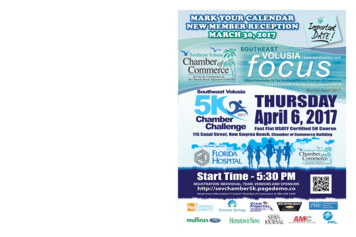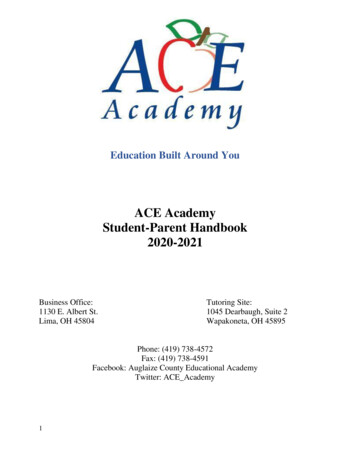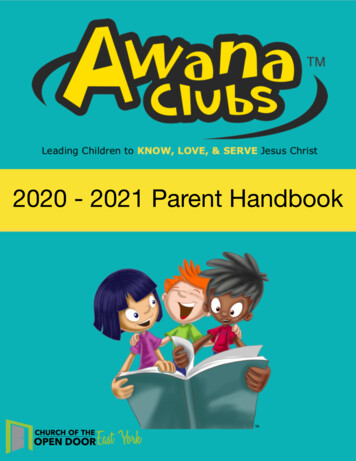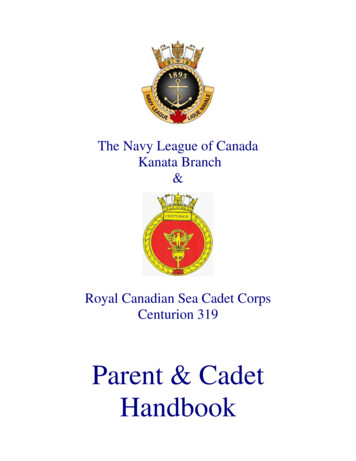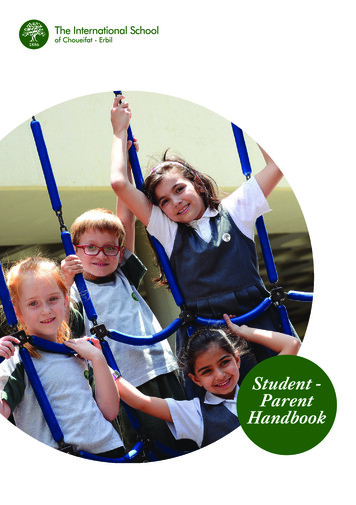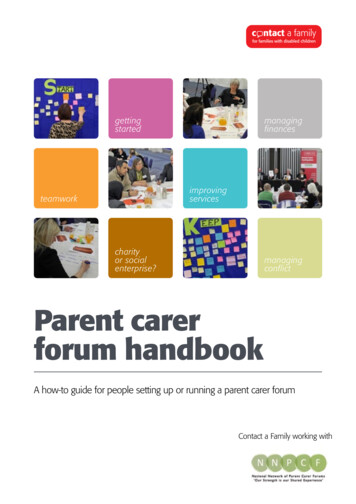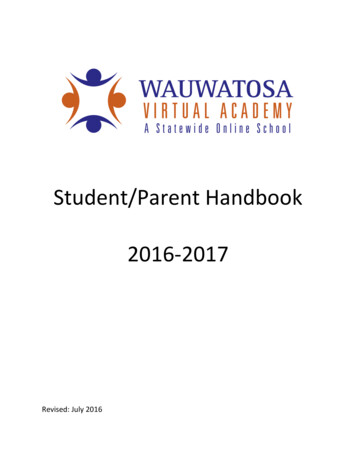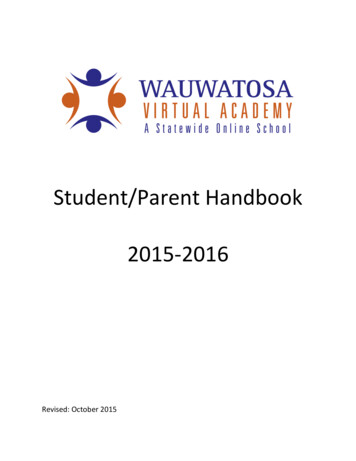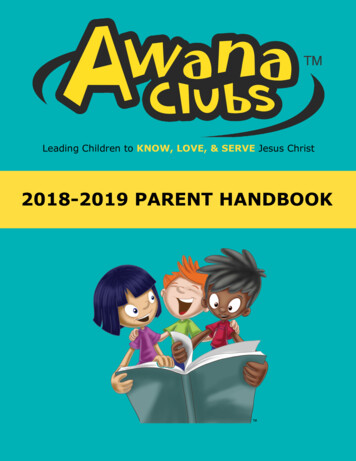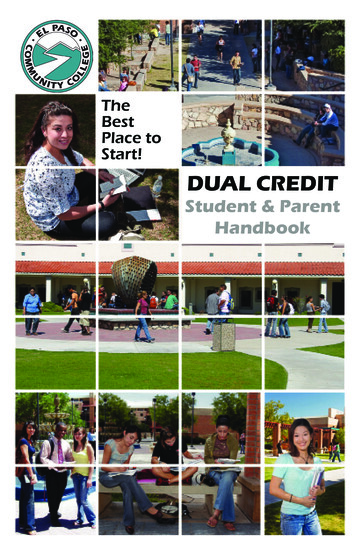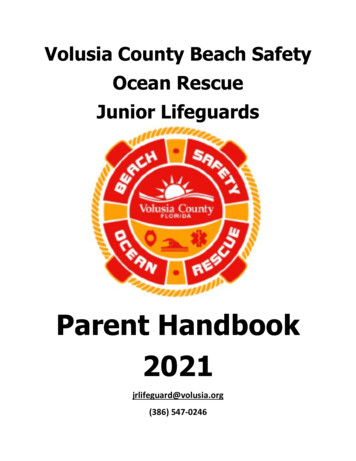
Transcription
Volusia County Beach SafetyOcean RescueJunior LifeguardsParent Handbook2021jrlifeguard@volusia.org(386) 547-0246
VOLUSIA COUNTYJUNIOR LIFEGUARDMISSION STATEMENT"SKILLS FOR LIFE"We are a team of professional Lifeguards, providing a fun and safeaquatic education to the youth of Volusia County by developing: Confidence Mental and physical fitness Respect for one another and the coastal environment1
Introduction To TheVolusia County Junior Lifeguard ProgramWelcome to the Volusia County Junior Lifeguards!The Volusia County Junior Lifeguard Program is regarded as one of the finest open watersafety training programs for children and young adults on the east coast. Since beingestablished in 1990, our primary goal is to provide "skills for life" for Volusia County's youth.Our curriculum ensures that Junior Guards (JGs) do activities and training that are appropriateto their age group and that they have an incentive to return year after year to take part in newand exciting activities. Some JGs even elect to continue their training and become Scouts,Seasonal Lifeguards or even full time Beach Safety Specialists or Senior Lifeguards.The program provides an important aquatic education for the youth of Volusia County.Activities include: swimming, running, body surfing, body boarding, surfing, kayaking, stand-uppaddling and water rescue training. Our program emphasizes personal safety, self-confidence,teamwork, goal setting, leadership, healthy habits, and environmental awareness. Bothcompetitive and cooperative activities play an important role in the development of these skillsand attributes. Additional subjects covered include beach ecology, surf and marine hazards, andpractical training in first aid including: CPR, wound dressing, and steps for spinal injurytreatment.The program is part of Beach Safety Ocean Rescue, a division of the Volusia CountyPublic Protection Department. All instructors are required to be active duty lifeguards wholeave their beach rescue duties for the summer to help educate Volusia County's youth. Theprogram maintains an excellent team of instructors who are screened, selected and trained fortheir assignment with the program. All instructors are United States Lifesaving Association(USLA) certified open-water lifeguards. In addition, each is either a certified EmergencyResponder or Emergency Medical Technician. The energy, high level of training and rescueexperience of our lifeguard instructors is a vital component to the Volusia County JuniorLifeguard experience.This Field Training Guide (FTG) will assist you in planning for upcoming camps. Use theFTG to help you understand the program’s policies, procedures and requirements.Parents/Guardians, we encourage you to review the FTG regularly with your JG. Once again,welcome to the Volusia County Junior Lifeguards!2
2021 TRY OUTS:Dates and LocationsSaturday, May 8:Deltona YMCA: 8-10amDeLand YMCA: 11am-1pmSaturday, May 29:Edgewater YMCA: 8-10amPort Orange YMCA: 11am-1pmSaturday, May 15:Edgewater YMCA: 8-10amOrmond YMCA: 11am-1pmSaturday, June 12:Ormond YMCA: 9am-12pmSaturday, May 22:Ormond YMCA: 8-10amPort Orange YMCA: 11am-1pm2021 CAMPS:Dates and LocationsCamp 1:June 7-11Andy Romano Park, Ormond Beach839 S. Atlantic Ave., Ormond BeachCamp 2:June 14-18207 Buenos Aires Ave., New SmyrnaCamp 3:June 21-25Frank Rendon Park2655 S. Atlantic Ave., Daytona Beach ShoresCamp 4:June 28-July 2Andy Romano Park, Ormond Beach838 S Atlantic Ave., Ormond BeachCamp 5:July 12-16207 Buenos Aires Ave., New SmyrnaCamp 6:July 19-23Frank Rendon ParkAdvanced Camp:July 26-30Ponce Inlet, Lighthouse Point Park35000 S Atlantic Ave, Ponce Inlet
Camp DescriptionsJunior Lifeguard Camp: (Sessions 1-6) The Volusia County Junior Lifeguard Camps are open tostudents ages nine to fifteen. It is a traditional Junior Lifeguard Program which stresses oceansafety, physical fitness, teamwork, and basic Junior Lifeguard competition skills. Students willlearn skills in CPR, First Aid, basic ocean rescue, surfing, and beach competition events. Campactivities will be quite strenuous, which is why a signed release is required attesting to thephysical health of all participants.The Junior Lifeguard Camp involves deep water swimming activities conducted in a lifeguardsupervised environment. In order to participate in such activities all prospective students MUSTdemonstrate the minimum skills required to insure their safety. These skills include (a)swimming 100 yards in deep water in less than 2 minutes 15 seconds, (b) treading in deepwater for five (5) minutes, and (c) swimming under water for ten (10) meters. Pleaseunderstand that if a child is unable to physically complete all phases of testing, he/she will NOTbe able to participate in the camps. This is done for the safety of the child, as well as thesuccess of the program.Advanced CampAdvanced Camp: The Advanced Camp is held at the Jetty in Ponce Inlet each year. Those JGs,who have participated in at least two (2) camps successfully and have been identified byinstructors as having strong aquatic skills, are eligible to participate. Students will be exposedto further development in a variety of areas. These areas include, but are not limited to, beachecology/oceanography/marine life, EMS skills for lifeguards and daily water activities. Thewater activities can include open water paddles and swims. Students will tour the MarineScience Center and the Ponce Inlet Lighthouse. Students will participate in simulated rescuesand learn lifeguard tower procedures. This camp is especially valuable to those who areconsidering a lifeguard position. It is also interesting and rewarding for any JGs who have apassion for the ocean and beach environment.4
Parent ResponsibilitiesIt is the sole responsibility of each parent or guardian to ensure safe travel for their child toand from the Junior Lifeguard Program. We strongly encourage parent carpools to our localspecial events and competitions. The County of Volusia and the Junior Lifeguard Program arenot responsible for students outside of scheduled program hours and activities. Parents areresponsible for their children immediately prior to and immediately following scheduledprogram hours. Parents are expected to be prompt at dropping-off and picking-up their JGs.Please remind children to be ready for pick-up, with all their gear, promptly at dismissal.InstructorsThe Junior Lifeguard Program is taught by professional Ocean Rescue Lifeguards. The lifeguardshave extensive experience and rigorous training in surf and ocean rescue, beach safety, first aid,and CPR. The instructors also have teaching experience with children. Several guest lecturers(local Volusia County marine experts) also share their knowledge and experiences with the JGs.Safety and education, while having fun, are our primary objectives.There will be a minimum of one paid instructor and 2 – 3 scouts per 10 participants. One JuniorLifeguard Program Coordinator will be on duty to supervise all camp activities during hours ofoperation.5
EnrollmentEnrollment in the Junior Lifeguard Program is first come - first served. Due to the popularity ofthe program, enrollment is expected to fill to capacity quickly. Students are considered enrolledin the program when they pass the try-outs and enroll online at www.Volusia.org.Note: It is necessary to submit the program fees with the application/waiver form in order toensure your child's place in the Junior Lifeguard Program. Failure to do so prevents thereservation of a spot for your child.RegistrationRegistration will be available April 1, 2021. In order to register for the Junior LifeguardProgram, visit our website at am.stml. You will then click on “OnlineRegistration” which will take you to a separate page. In the upper right corner you will click on“Sign In”. If you already have an account with Volusia.org you can sign in; if you do NOT, thenyou will choose “Create an Account”. NOTE: Please be sure to “add a member” which will beyour child when creating your account. This is IMPORTANT, because you need to be able tochoose their name as the person attending camp.Once this step is complete, you can choose the location and week you would like to sign yourchild up for and register them online. The process will ask you for their uniform sizes, allow youto pay online with a credit card and will have you sign a waiver. Once this is all complete, youwill receive a confirmation email.6
Volusia County Junior LifeguardGeneral OrdersIn order for the Junior Lifeguard Program to provide a safe and effective learningenvironment, all Junior Guards are required to follow these rules:Directions: Please return a copy signed to your Junior Lifeguard Instructor the first day of theprogram.1.Arrive ON TIME and in uniform with required gear in your gear bag.2.DO NOT bring any valuables. (Examples: I-Pods, jewelry, money, etc.)3.Cell Phones are NOT allowed to be used during class time.4.A note is required from the JG’s parent/guardian to be excused.5.DO NOT wear JG uniform outside of class.6.ALWAYS throw away your trash and any you see.7.Respect fellow Junior Lifeguards.8.Exhibit good sportsmanship at all times.9.Junior Lifeguards should ALWAYS be polite, courteous, and respectful to all.10.Answer all questions with “yes”, rather than “yeah”, “yep”, etc.11.Do not use Junior Guard equipment without permission and treat all JGequipment with care.12.Do not take other people's things without permission.13.Do not engage in inappropriate behavior or use inappropriate language or handgestures.14.Remain alert at all times and be responsible for your own safety.15.Always use the “buddy system” (3 people).16.JGs will ALWAYS wear HELMETS when riding bikes, NO EXCEPTIONS!17.Always act immediately upon the request of instructors and scouts.18.Remember: Junior Lifeguards represent the County of Volusia!“I have read the Junior Lifeguard General Orders and I agree to follow them. Iunderstand that violating any of the Junior Lifeguard General Orders, may result indisciplinary action.”JUNIOR LIFEGUARD SIGNATUREPARENT SIGNATURE7
DisciplineStudent Discipline for Minor IncidentsFor the Junior Lifeguard Program to be successful, students must exhibit behavior that isrespectful of our staff, other students, equipment and facilities. Group activities are vital toour program. A student who is disruptive or disrespectful to instructors diminishes theenjoyment and education of the other students.The intent of discipline is to gain compliance while instructing the student in acceptablebehavior; therefore, please familiarize your JG with the following expected behaviors: Respect of instructors and other staff Respect of other students: no shoving, hitting or insulting Respect the facilities, equipment and property of others Cooperation with others and good sportsmanship Following all safety rules and instructions Listening to directions and announcements Participation in activities Reporting problems to instructorsThe progressive steps of discipline are as follows:1.When a minor discipline situation occurs, the student will be counseled aboutthe situation and given an explanation of what behavior change is expected.2.If a subsequent incident occurs, the student will be asked to take a"TIME OUT". A "TIME OUT" is a period of five to ten minutes that the studentspends quietly reflecting on the incident. After the "TIME OUT" the student isallowed to rejoin the group activity.3.If a student has a series of discipline situations in the same day or over severaldays, the lead instructor will inform the student's parent or guardian about thesituation.8
4.If a student continually disregards the instructors or shows little or noimprovement with steps 1 through 3, the student will be suspended from theprogram for one day. The parent or guardian of the student will be informed thatthe student has been suspended. There will be no prorated refund of fees.5.If, after suspension, the student's behavior is still not acceptable, the parent orguardian of the student will be informed that the student may no longer attendany of the program's activities during the camp session. There will be no refundof fees.Major first-time incidents may progress the student directly to step 4 or step 5 of the aboveprocedures. Major incidents would include: Insubordination Fighting with another student or other person Unlawful or non-consensual touching of another person Stealing the property of another Vandalism of equipment or facilities Any behavior which compromises safetyAny time a major behavior problem occurs, the Junior Lifeguard Program Coordinator shall beadvised and the parents will be notified immediately.9
Uniform Policy and RequirementsJunior Lifeguards (JGs) must report in the required uniform each day. JGs not conforming topolicy will not be allowed to participate that day. For safety reasons, there will be NOEXCEPTIONS!1.All JGs must wear a Volusia County uniform rash guard each day. No other shirtsor rash guards are permitted.2.Girls must wear a Volusia County Junior (VCJR) Lifeguard Issued One Piece Suit.3.Girls may only wear red shorts over their suits. Shorts may not have any trimor designer logos. Small brand tags are acceptable.4.Boys must wear red shorts. Shorts may not have any trim or designer logos.Small brand tags are acceptable.5.All shorts must be worn appropriately and around the waist. Boys may not haveany undergarments showing.6.Additional recommended items include: proper foot protection (athletic styleshoes or sandals), sunscreen, a pen, and Field Training Guide (FTG).7.Any optional uniform items must be official VCJR issue.8.Finally, all personal gear should be marked with your first and last name on theoutside for easy identification. The VCJR Program and Staff are not responsiblefor any lost uniform items or personal property.9.For safety reasons, JGs are not permitted to wear any jewelry during JGoperations.10
Public RelationsWhen JGs are wearing their uniform, they represent the County of Volusia. Consequently, JGsare expected to be on their best behavior. Many members of the public recognize the VolusiaCounty Junior Lifeguard uniform. Citizens looking for information may approach JGs. JGs areexpected to answer questions from the public politely and correctly. If they do not know theanswer, they should refer the citizen to an instructor or another lifeguard.Occasionally, JGs may be present during emergencies on the beach. During emergencies,crowds often gather, creating a complicated situation for lifeguards and other rescuepersonnel. To avoid interfering with emergency personnel, JGs should immediately go to theirinstructors and wait for direction. Scouts (older Junior Lifeguards) may be asked, by theirinstructors, to help with an emergency. JGs assisting with emergency incidents are expected tobehave responsibly and to follow directions exactly.Maintaining a positive relationship with the public is a top priority of Beach Safety OceanRescue. The Junior Lifeguard Program is a critical component of this relationship. All of ouruniformed personnel, including our JGs, should view themselves as ambassadors of the Countyof Volusia.11
AttendanceAttendance is taken daily. Regular attendance is encouraged and will allow students to fullybenefit from the program. Please notify your child's group instructor if your child will be absent.Participation in ActivitiesSTUDENTS ARE ENCOURAGED TO PARTICIPATE IN ALL REGULAR PROGRAM ACTIVITIES. Parentsshould be aware that rigorous physical exercise and ocean swims are a daily part of theprogram. If a student is unable to participate in certain activities, the student should give a note(from a parent or guardian) to one of the instructors first thing in the morning. Exercise andactivities will vary depending on age, size, strength, ability, confidence level, and oceanconditions. Students may not experience the same activities during camp. Paddleboards andother equipment require body weight and strength. Instruction will be differentiated forstudents, based on readiness and skill level. If you have questions, please see one of theinstructors.Age RequirementsThe age requirement for the Junior Lifeguard Program is nine (9) to fifteen (15) years of age onthe first day of instruction. Much of the training will be in one large group; however, theparticipants will often be divided into two or three smaller groups. The groups are primarilybased on age; but size, strength, swimming ability, and confidence are also considered.Junior Lifeguard Daily ItineraryEach Junior Lifeguard Instructor will follow a daily schedule of planned activities which will givethe participants the learning experiences outlined in the Junior Lifeguard weekly curriculum.Parental guardians should be aware that factors such as inclement weather, ocean conditions,availability of guest lecturers, and other educational opportunities may alter the daily scheduleat any given time.12
2021 Program FeesThe cost is 150.00 per session, for the Junior Lifeguard Camps. The Advanced Camp is 200.00. No reduced rates are possible if your child cannot attend a full session. You may notsplit sessions. There will be a 20.00 entry fee for anyone participating in the SoutheastRegional Junior Lifeguard Competition. The tuition fees include a Junior Lifeguard uniform tshirt, lectures, instruction, beach activities, and use of equipment.Refund PolicyRefunds for the Junior Lifeguard Camp registration will be processed in the event your child isunable to attend due to unexpected reasons, i.e. Illness, injury, etc. Accommodations to switchcamps will also be performed as long as spots are available in the desired camp. You MUSTsend an email to jrlifeguard@volusia.org to make this request.Junior Lifeguards should bring the following items tothe beach EVERYDAY:Boogie board, fins, etc. (Hard surfboards are not permitted)OptionalTowelREQUIREDGear Bag(to keep all of your stuff together)REQUIREDBe in Uniform(JG rash guard)REQUIREDSun Protection(sunscreen)REQUIREDFoot Protection(sandals, shoes, booties, etc.)OptionalPositive & Enthusiastic AttitudeREQUIRED!!!13
Special AccommodationsProspective students desiring special accommodations or services under the Americans withDisabilities Act should notify the Program Coordinator at least sixty (60) days prior to the startof the program, or as soon as reasonably possible.Notice of Nondiscriminatory PolicyThe County of Volusia Junior Lifeguard Program admits students, of any race, color, national orethnic origin, to all the rights and privileges, programs, and activities generally accorded ormade available to students in the program. The County of Volusia does not discriminate on thebasis of race, color, national and ethnic origin in administration of educational policies,scholarships, athletic and other programs.Comments & SuggestionsYour comments, suggestions, input, and ideas on our program are welcome and greatlyappreciated. Please feel free to email the Program Coordinator atjrlifeguard@volusia.org. You can also phone, fax, write, or just stop by!14
Beach Safety TipsThe most common reason for aquatic problems is a lack of safety knowledge. Volusia CountyLifeguards recommend the following safety tips:1.2.3.4.5.6.7.8.9.10.11.12.13.14.15.16.Learn to swim and never swim alone.Swim near a lifeguard.Ask a lifeguard about the conditions before entering the water.Children should be supervised closely, even when lifeguards are present.Do not rely on flotation devices such as rafts; they may be lost while in thewater.Swim parallel to shore if you wish to swim long distances.Scuba dive only when trained and certified and within the limits of your training.While in the water, never turn your back to the ocean; large waves can comewithout warning.Protect your head, neck, and spine-do not dive head first into unfamiliar waters.Follow posted regulations and lifeguard instructions.No glass containers at the beach. Broken glass and bare feet do not mix.Keep beach fires in designated areas. Fire residue and superheated sand canseverely burn bare feet. Keep barbeques elevated above the sand at least 12".Report hazardous conditions to lifeguards or beach management personnel.Stay clear of coastal bluffs. They can collapse and cause injury.Substances that impair judgment don't mix well with ocean activities.Rip Currents:o Rip currents are the most threatening natural hazard along our coast. Theypull victims away from the beach. The USLA has found that 80% of therescues made by ocean lifeguards involve saving those caught in rip currents.o Rip currents are sometimes mistakenly called "rip tides" or "undertows."These terms are incorrect. Rip currents are not associated with tides and donot pull people under.o Avoid swimming where rip currents are present. However, if you are caughtin a rip current, swim parallel to the shore (don't swim against the current)until the pull stops and then swim back to shore. If you are unable to returnto the beach, remain calm, tread water, and wave for lifeguard assistance.o To avoid rip currents, stay at least 100 feet away from piers and jetties. Ripcurrents often exist along the side of fixed objects in the water.15
KNOTS16
Phonetic AlphabetSMART eRelevantTime Frame17
Feb 12, 2021 · Junior Lifeguard Camp: (Sessions 1-6) The Volusia County Junior Lifeguard Camps are open to students ages nine to fifteen. It is a traditional Junior Lifeguard Program which stresses ocean safety, physical fitness, teamwork, and basic Junior
